Community-based Organizations Supporting HIV Self-Testing
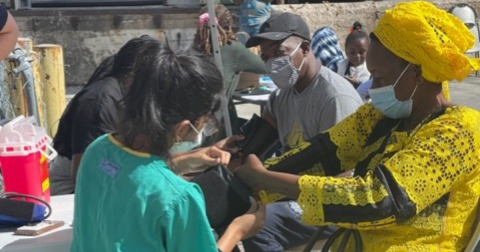
African Family Health Organization: A Moment of Triumph
As part of their health services for African and Caribbean immigrants and refugees, the African Family Health Organization (AFAHO) provides free HIV screening and related counseling to their clients in the greater Philadelphia area. One HIV-positive client was extremely reluctant to share her status with her partner. AFAHO staff worked with her closely for a few months, eventually convincing her to take two HIV self-tests home for herself and her partner, and to use the test results as a way to break the difficult news. The client later shared with staff that while telling her partner was hard, she also felt immense relief, especially when her partner tested negative. She planned to bring her partner into AFAHO for further HIV information and counseling. “This was a moment of triumph for our staff,” says AFAHO staff member Oni Richards, “We are hoping this process can be replicated if a similar situation arises.”
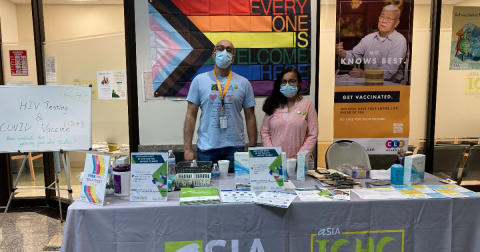
Asian Services in Action: Signaling Safety
A large pride flag welcomed community members to all health center locations of Asian Services in Action (ASIA), a health and human services organization for Asian Americans and Pacific Islanders in Akron, Ohio. The prominent flags, emblazoned with the words “Everyone is Welcome Here,” remained up during ASIA’s HIV prevention outreach efforts indicating safe spaces for LGBTQ+ community members to speak with staff about the importance of HIV testing and other health concerns. Thanks to these frank conversations, many previously hesitant community members agreed to be tested at the event or took home free HIV self-testing kits. “From hesitation to confidence, just by creating a welcoming and safe environment,” said Tamoor Rashid, ASIA Community Health Program Manager.
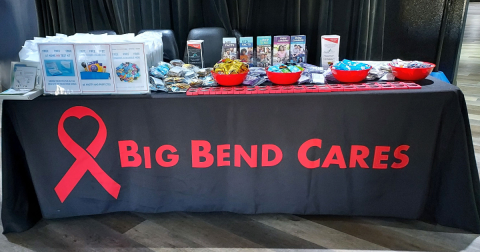
Big Bend CARES: Keeping it in the Family
Big Bend CARES (Big Bend Comprehensive AIDS Resources, Education and Support, Inc.) in Tallahassee, Florida took advantage of an anti-bullying rally to successfully promote their HIV Self Testing Program to the young adults attending the event and their parents. One mother inquired about the HIV self-test kits, not for her teenagers, but for herself and her husband. She explained to staff that though she herself sees a doctor for regular health screenings, her spouse does not, claiming “If you are fine, then I must be fine. If you don’t have anything, then I must not have anything.” She thought the non-invasive HIV home tests along with Big Bend’s other health services could help encourage her husband to start taking charge of his own health. She left the rally with two home test kits, and planned to make health screening appointments at Big Bend that they could go to together.
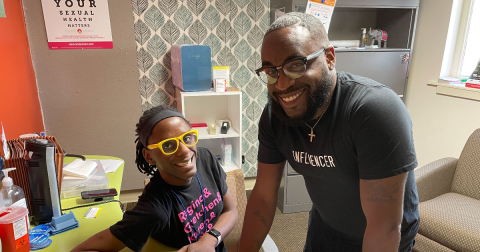
Caracole: Support with No Borders
In its fight for health equity, AIDS service organization Caracole proved its outreach goes beyond the greater Cincinnati, OH area it serves. A high-risk client residing in nearby Northern Kentucky had ordered a home test kit from the Caracole office. When the client followed up to report his negative test, Caracole staff provided him with information about HIV transmission and prevention through pre-exposure prophylaxis (PrEP). Living across state lines in Kentucky disqualified the client from Caracole’s HIV Prevention Assistance Program Intervention (PAPI). But Caracole staff helped the client find the local resources he qualified for so that he could start PrEP to protect himself from HIV.
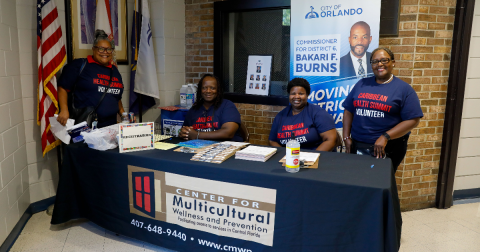
Center for Multicultural Wellness and Prevention: A Friend in Need
The Center for Multicultural Wellness and Prevention (CMWP) uses HIV self-testing kits to further its mission of enhancing health, wellness, and quality of life for diverse populations in Central Florida. The personal story of a CMWP team member shows how the work makes a difference. He had been working on the CMWP’s HIV Self-Testing program for a few months, when his best friend began talking to him about high-risk sexual behavior. He felt concerned for his friend, yet because of his experience working in the HIV Self-Test program, he felt comfortable initiating a conversation about HIV prevention and safe sex. He convinced his friend to take a test. They were both glad to learn that his friend was HIV negative and now has also looked into taking pre-exposure prophylaxis (PrEP) to further protect himself moving forward.
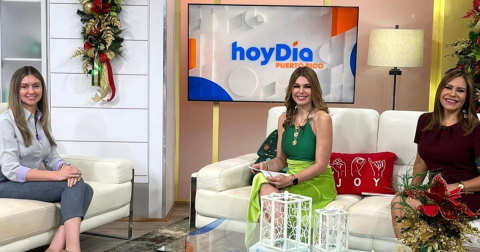
Centro Ararat: Puerto Rico, No Doubt!
Centro Ararat in Puerto Rico fulfilled 4,816 requests for HIV self-test kits for people all over the island, nearly doubling its initial goal. “This is one of our greatest achievements!” says Norma Cartagena Colon, Manager of Centro Ararat’s Education Division. As it increased distribution of kits through the mail and at outreach events, Centro Ararat also ran a multi-platform media campaign to further promote its HIV Self-Testing program. Staff participated in numerous radio and TV interviews, and created a website LoPostivoEs, using the slogan “Lo positivo es vivir sin dudas,” (“Living a good life is living without doubt”) to highlight the importance of knowing your HIV status.

Coalition of African Communities: Community Influencers in Action
The Coalition of African Communities (AFRICOM) in Philadelphia integrated its HIV Self-Testing kit distribution program throughout its pre-existing community outreach efforts. Health Coordinator Blessing Bwititi attributed the program’s success to the fact that AFRICOM enlisted trusted community messengers to connect with hard-to-reach people who could benefit from an HIV Self-Test. AFRICOM also distributed kits to walk-in clients and at clothing drives, food distribution sites, and community meetings.
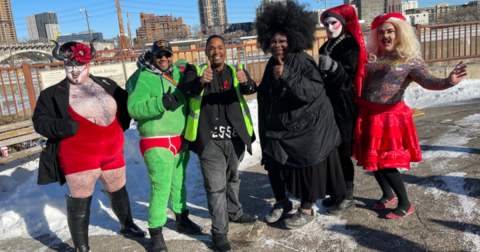
Encouraging Leaders: Grinning and Baring It
The dress code was red undies. The temperature: a mere 11 degrees. The backdrop: snow-lined streets. Encouraging Leaders in Minneapolis celebrated World AIDS day in a uniquely colorful way that raised participants’ heart rate along with HIV/AIDS awareness. At the “Red Undie Run” in December 2022, stalwart runners stripped down to their underwear to run a half-mile course in wind chill that felt like -1 degrees. Along the route, Encouraging Leaders provided information about its HIV Self-Testing program, promoting the value and de-stigmatization of knowing your status. One of the event organizers quipped, “Frostbite and hypothermia are real things!”
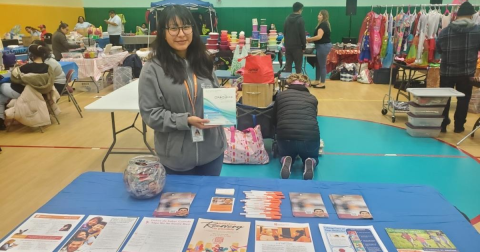
Esperanza Health Centers: The Power of Hope
Esperanza Health Centers in Chicago lives up to its promise of delivering HIV-related health services and hope to the community. A Spanish-speaking pregnant woman came to Esperanza seeking counseling and care because her partner is HIV-positive. Although the woman had been taking pre-exposure prophylaxis (PrEP) to protect herself from HIV, she was still living in fear of infection for herself and her baby. The stigma and fear of HIV/AIDS in her family and community, combined with Spanish language barriers prevented her from getting reliable information about HIV prevention and transmission. Esperanza staff member Marisela Garcia-Martinez counseled the woman in Spanish and gave her HIV Self-Test kits to take home. The client was visibly relieved to have the facts, the tests, and the support of a bilingual health worker right in her Brighton Park neighborhood.

Florida Harm Reduction Collective: Peer Connections Get Results
Knowing people are more likely to accept help from someone they trust, Florida Harm Reduction Collective (FLHRC) developed an HIV self-testing program with a personal touch. The collective has enlisted peer outreach workers to visit unhoused People Who Use Drugs (PWUD) and distribute the HIV self-test kits in person. The peers, who all have lived experience, go to communal hangouts, trap houses, and parks where the unhoused sleep to distribute the kits. Peers offer to stay with participants for help and support while they take the test, allowing them to then deliver referral information on the spot. They also give away hygiene kits as a way to build rapport, with no strings attached. Since the program started in June 2022, peers have had over 700 interactions with unhoused People Who Use Drugs and have distributed more than 1,000 HIV Self-Testing kits.
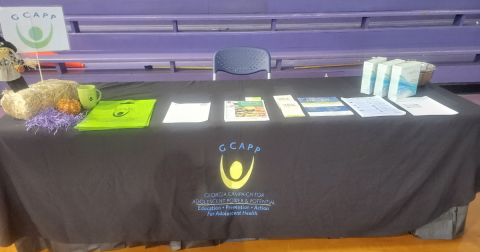
Georgia Campaign for Adolescent Power & Potential: A Fair Chance
As part of its mission to help young people make healthy lifestyle choices, Georgia Campaign for Adolescent Power & Potential (GCAPP) works statewide with schools and youth organizations to provide HIV education and testing. At an outreach event at the annual Crawford County Health Fair, GCAPP distributed free self-test kits and HIV information. One woman attending the fair spoke with GCAPP staff, sharing that her 25-year-old son’s active dating life had her concerned about his HIV status. Despite her efforts, she had not been able to convince him to visit a clinic for testing. She told staff she was grateful for the event and the free self-test kit to take home to him.
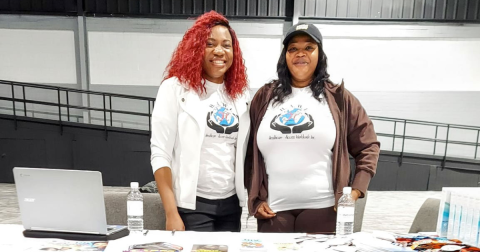
Healthcare Access Worldwide, Inc.: Paying it Forward
Healthcare Access Worldwide, Inc. (HAWI) in Cleveland, Ohio works with immigrants from countries in Africa, focusing on HIV prevention and education about treatment for clients with HIV. HAWI founder Dr. Faith A. Richard tells the story of a 46 year-old self-employed truck driver, originally from Senegal. The man’s sexual partner wanted him to find out his HIV status, but he was only willing to test if he could do it at home. The HAWI-provided self-testing kit allowed him to do just that. The client tested negative, and HAWI gave him condoms and STI educational materials. The Care Coordinator also advised him to take pre-exposure prophylaxis (PrEP) if he changes sexual partners, has multiple sexual partners, or when he does not know his partner’s HIV status. The client was so inspired by his experience with HAWI’s outreach and health services that he now volunteers for their HIV Testing program.

In the Meantime Men's Group, Inc.: Lights, Camera, Action!
As one of the premier health and wellness organizations for Black gay men in Los Angeles, CA, In the Meantime Men's Group, Inc. (ITMT) draws aspiring actors, dancers, filmmakers and other creatives to its programs and services, including HIV self-testing. ITMT client and filmmaker Nathan J. Lee shared that the self-testing experience was intense. “I had a slight panic attack when I opened the box for the first time. It took a moment for me to take the test but I'm glad that I had the option,” explains Nathan. He was so inspired by the range of emotions he’d felt that he decided to make a short film about the experience. His film, titled “Positive,” tells the fictional story of a young woman grappling with the mental hurdles around taking an at-home HIV test. Nathan hopes his film, once finished, can serve as a foundation for education and discussion.
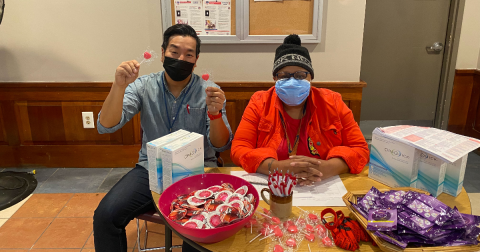
Lantern Community Services: Setting the Table for Better Health
To commemorate World AIDS Day 2022, Lantern Community Services in New York City distributed HIV self-testing kits at seven of its supportive housing buildings. This work was part of Lantern’s KEP (Knowledge = Power) initiative. At each location, Lantern’s trained resident peers set up tables with an assortment of health and wellness materials, including HIV self-testing kits, safer use kits, condoms and AIDS Awareness Day themed gifts. Thanks to the effort, Lantern distributed 41 self-testing HIV kits. “It was exciting to engage individuals that you may have seen in passing but never spoke to,” said KEP Resident Peer Brian Carmichael, who added that participating in the event “showed me that I can do this. We exceeded our expectations!”
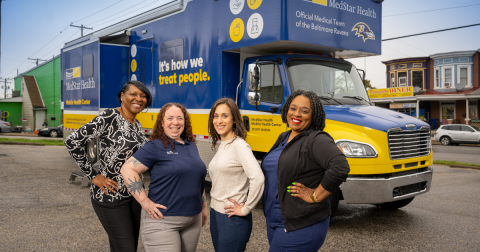
MedStar Health: Mobile Health Center Offers HIV Self-Test Kits
In line with its commitment to making healthcare more accessible across Baltimore City, MD, MedStar Health has successfully taken its HIV self-testing program on the road. The MedStar Health Mobile Health Center provides primary care and other services, including HIV testing, by holding regular hours at several partner community organizations throughout South Baltimore: Drink at the Well, the Transformation Center and Cherry Hill Tenants Association. Recently, a member of the community visited the Mobile Health Center to request an HIV self-test following exposure through an HIV-positive partner. Fortunately, the test result was negative, and the MedStar Health team pointed the patient in the right direction for follow-up care and pre-exposure prophylaxis (PrEP) treatment.
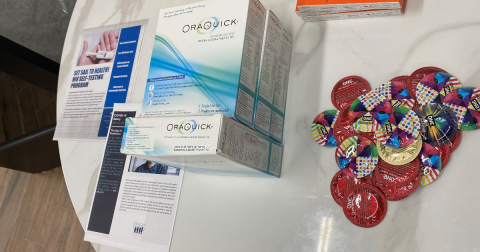
New York Council on Adoptable Children: Sexual Health is Self-Care
When the New York Council on Adoptable Children (COAC) teamed up with Black Girls Smile for its “Safe Space Saturday” in Brooklyn, NY, the organizations doubled their community impact. COAC’s HIV Self-Test kit distribution effort fit right into the Saturday event, designed to help Black girls and women connect with licensed mental health providers while also enjoying some health and wellness experiences like a relaxing massage. One woman shared with COAC staff Meagan Owens that she once thought of self-care as only massages or manicures, but now understood it also includes sexual health, delighting Ms. Owens who added “I think it’s great when I can broaden people’s ideas about what health looks like.”
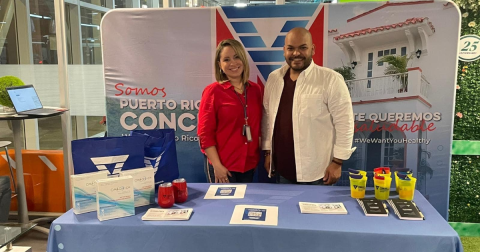
PR CONCRA: HIV Testing Anytime, Anywhere
Puerto Rico Community Network for Clinical Services, Research, and Health Advancement (PR CONCRA) has been providing HIV education, prevention and treatment for over 30 years. To promote its HIV Self-Testing Program, the organization’s most effective tool has been community outreach activities. At one such recent event, a woman engaged PR CONCRA staff member Alejandro Santiago in an emotional conversation, sharing how her best friend had contracted HIV in the 1990s, and had struggled with lack of services and support. The woman expressed gratitude for PR CONCRA’s work in changing attitudes about HIV and creating greater access to HIV self-testing kits so that “people in 2022 can get tested for HIV anytime, anywhere.”
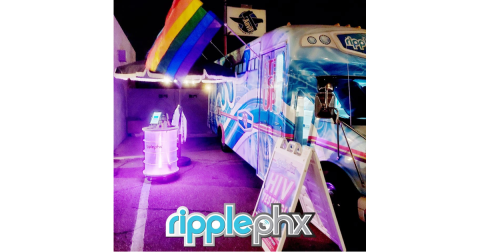
RipplePHX: HIV Self-Testing Kits Join the Party
When Ariel shows up in Phoenix Arizona, it’s the sign of a good party. Ariel is RipplePHX ‘s HIV self-testing kit storage unit on wheels, well-known for its hard-to-miss presence at area nightclubs and RipplePHX outreach events. RipplePHX staff maneuver the portable, neon-lit unit around designated locations, precipitating conversations around HIV prevention and prompting the distribution of self-testing kits. RipplePHX co-founder Jason Jones explains: “Ariel makes the introduction for us, but the superstars that talk about our mission, about at home HIV Tests and make those connections are our amazing staff, influencers, and volunteers.” Along with Ariel, RipplePHX’s HIV prevention program includes The Chariot, a brightly painted bus that houses a fully-mobile HIV testing facility.
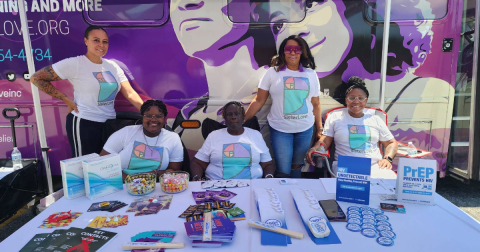
SisterLove, Inc.: Sisters Unite
Thanks to a successful social media campaign supported by female artists, SisterLove, Inc., a women’s HIV/AIDs and Reproductive Justice Organization headquartered in Atlanta, GA has distributed over 700 HIV self-test kits to 19 states nationwide. The campaign directed people to SisterLove’s website for home-test kit requests and promoted community events where SisterLove staff gave away kits along with their SisterLove safer sex kit that includes condoms and STI-prevention information. One female artist who contributed to the social media campaign felt strongly that “by representing diverse individuals in the campaign, it will help to break down stigmas and encourage more people from these communities to get tested and be proactive about their sexual health.”
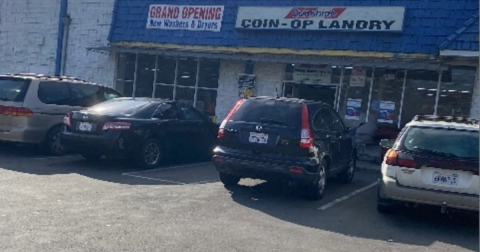
St. John's Community Health: Suds and Kits
The PRIME Specialty Clinic Team of St. John's Community Health offers testing and other support services for HIV and other communicable diseases in Los Angeles, CA. As part of their HIV Prevention Program, the PRIME Team sponsored an outreach event at a local laundromat, where members of the community could do their laundry free of charge as well as pick up free HIV self-testing kits and other STI-prevention supplies like condoms. Participants attending the event expressed gratitude for having access to the testing kits for themselves, but also for their sexual partners and their family members.
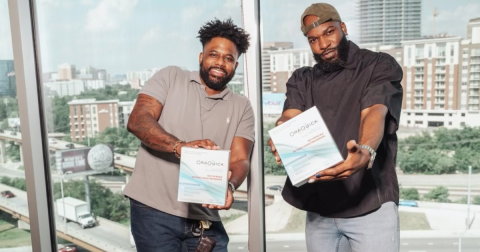
The Freelux Project: Bridging the Gap
As part of its mission to provide support and equitable access to healthcare to the LGBTQ+ community, The Freelux Project based in Dallas, TX created the web-based LuxTest to ship free HIV self-testing kits by online request. The Freelux Project staff anticipated a greater response for testing kits from Men who Have Sex with Men (MSM) and Men of Color, so they were surprised when more than half the LuxTest requests came from heterosexual Black women. The Freelux Project founder Nathaniel Holley explains that “there has been an untapped market for online healthcare utilized by Black Women” and that “filling this gap is a success for the program.” Thanks to the LuxTest, The Freelux Project is on target to ship more than 700 HIV self-testing kits all over the country.
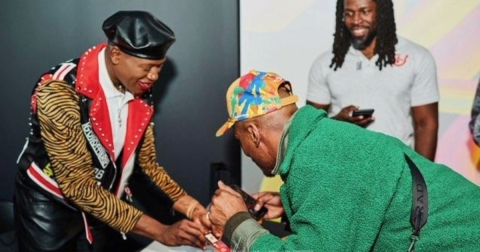
THRIVE SS: Advertise and Thrive
As part of its mission to support Black Gay men living with HIV in Atlanta, THRIVE SS, uses a variety of approaches to successfully promote its HIV Self-Testing program. For instance, the organization receives and fulfills direct requests for HIV self-testing kits through its website, increasing access and ensuring privacy. And recently, THRIVE SS has been able to increase its kit distribution significantly by advertising on popular dating apps like Jackd and Adam4Adam. Through new partnerships, THRIVE SS has also started expanding its outreach effort to Latinx communities, as well as connecting with the LS (swinger) community, and Black cisgender women.
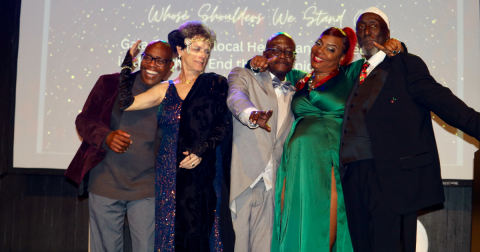
UNIFIED HIV Health and Beyong: A Time to Celebrate
UNIFIED HIV Health and Beyond in Detroit, Michigan has been serving the community for 40 years. The team celebrated its decades-long success on World Aids Day (December 7th, 2022) with the inaugural “Whose Shoulders We Stand On” Gala at the city’s historic St. Andrews Hall. The celebration featured music, food, and awards and showcased UNIFIED’s HIV Self-Test kit distribution effort. Thanks to the efforts of community partners, the planning and execution came together quickly and successfully, inspiring plans for a second annual celebration.

U. of Arkansas for Medical Sciences: A Campaign for Support
The University of Arkansas for Medical Sciences (UAMS) successfully expanded its HIV Self-Testing Program by combining a robust print and social media campaign with community outreach events. UAMS’s Department of Family and Preventative Medicine (DFPM)’s HIV Team spearheaded the effort, promoting its online mail-in order system for HIV self-testing kits through printed pocket fliers with QR codes, as well as distributing kits at numerous health fairs. At one such event, a homeless client who was also a substance abuser was relieved to find out about the free self-testing kits. She was worried she’d been exposed to HIV through a contaminated needle. DFPM faculty member Latunja Sockwell helped the client take a self test, which came out negative. Sockwell then gave her a safe sex kit, and a referral for pre-exposure prophylaxis (PrEP).
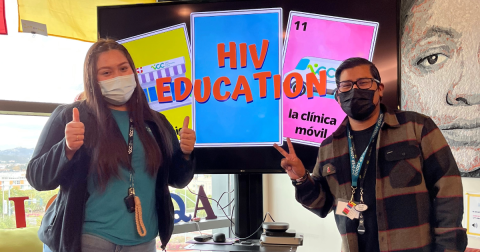
Vista Community Clinic: Putting Teamwork to the Test
In honor of World AIDS Day in December 2022, the HIV team at Vista Community Clinic (VCC) in San Diego, CA put on a multi-part event at California State University San Marcos to promote its HIV care services to students and all members of the campus community. At one campus location, the VCC mobile testing unit provided free, in-person rapid HIV testing. Meanwhile, other team members set up a promotional table to give away HIV self-test kits along with condoms and lube. At the campus Pride Center, VCC staff invited students to a free “HIV 101” information session. VCC staff member Ulises Reyes called it one of the group’s “more successful events” because “it relied heavily on teamwork, collaboration with other organizations, and the implementation of multiple resources from all staff.”

We Think 4 a Change: Navigators Making Change
We Think 4 a Change (WT4AC) successfully distributed HIV self-testing kits in Cleveland, OH in part due to its robust calendar of outreach events that furthers awareness and education around HIV. At these numerous events, Peer Navigators engaged directly with the community to give away tests and help reduce the stigma of HIV/AIDS. In fact, this distribution effort worked so well that WT4AC ran out of testing kits! Thankfully, the group was able to extend its reach through an additional partnership with the Cuyahoga County Board of Health so it could continue its HIV testing kit distribution program.
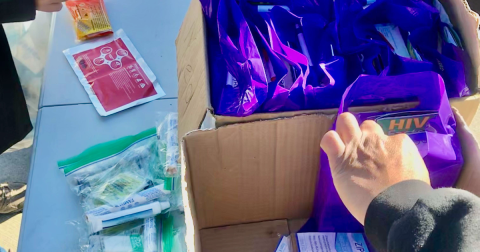
AIDS Ministries/AIDS Assist: Room (and Assistance) at the Inn
AIDS Ministries/AIDS Assist (AMAA) of Northern Indiana recently partnered with a local agency that houses the chronically homeless. The partnership allows AMAA to provide HIV Self-Test kits and other harm reduction resources to those in need, meet people where they are, and build trust. The HIV Self-test kits proved a perfect starting point for further education on harm reduction through pre-exposure prophylaxis (PrEP). The effort shows how creative thinking and partnerships can go a long way towards building a strong foundation of assistance and support for an underserved community.

Baton Rouge Black Alcoholism Council: A Major Influencer
Who better than a celebrity rapper to reach a young audience? To spread the word about their HIV Self- Testing program to young African Americans, the Baton Rouge Black Alcoholism Council (BRBAC) of Metro Health in Baton Rouge, Louisiana worked with Hot Boy Major, a popular local musician/comedian, to create a highly successful social media campaign. Hot Boy Major’s original skit promoting the ”Love Yourself, Test Yourself” message, and sharing where to pick up free HIV self-test kits, received an impressive 38,000 views. “This was by far the greatest number of individuals we were able to reach with one post,” said BRBAC Staff Member Shirley Lolis. As a result, BRBAC saw an immediate rise in community inquiries about their HIV program and in the distribution of self-test kits at their local centers.
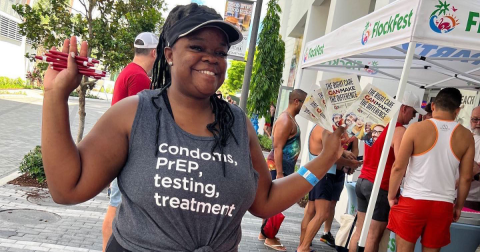
CAN Community Health: Sharing Best Practices for Impact
CAN Community Health headquartered in Sarasota, Florida has been serving the needs of the HIV community for over 30 years, through health services and education. As validation of their longtime experience and commitment, CAN was invited to showcase their successful HIV Self-Testing program at the SYNC 2022 national conference that focused on HIV, Hepatitis, Hepatitis C, STI’s, Harm Reduction and LGBTQ+ Health. In their presentation "Self-Testing as a Means of Reaching Populations Disproportionately Impacted by HIV," CAN reached a national audience to help promote best practices with HIV self-testing programs.
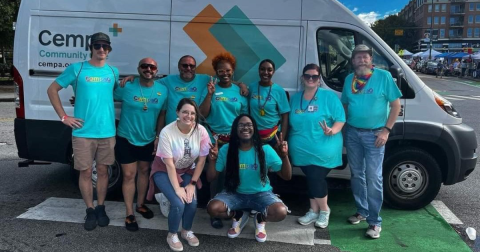
Cempa Community Care: Act Locally, Expand Nationally
Cempa Community Care’s HIV Self-Testing program in Chattanooga, Tennessee serves its local community with care, and has been so successful that it’s now getting requests for kits from people all over the country. Prevention Program Manager Robert Cornelius explains that “Cempa has incorporated the HIV self-test kits into all of its educational outreach programs. With the kits, Cempa includes information about HIV, pre-exposure prophylaxis (PrEP), facts on condoms, STIs, and Hepatitis C.” Cornelius has sent kits as far away as the State of Washington. When it comes to testing, Cornelius adds, “Keep it as simple as possible. Make it easy to get tested, and people will get tested.”

Center for Pan Asian Community Services: Pride in the Program
The Center for Pan Asian Community Services (CPACS) took its HIV Self-Testing program directly to the community, by giving away free testing kits at the annual Atlanta Pride Festival in October 2022. CPACS Health Program specialist Mutasem Shopon says festival attendees were grateful to accept the kits, knowing they could take the HIV tests safely in the privacy of their own homes with their partners. By distributing free tests at the Pride Festival site, CPACS was also able to help overcome financial barriers and lack of transportation services to and from testing clinics.
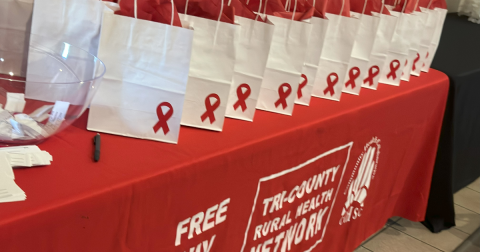
Cherokee County Health Services Council: It's a Gift
Sometimes presentation is everything. That’s a lesson the Cherokee County Health Services Council (CCHSC) in Tahlequah, Oklahoma took to heart. When Project Director Paul Martinez noticed that his team was having trouble giving away HIV self-test kits to local organizations and high schools in their rural community, the group came up with an ingenious solution. CCHSC repackaged the kits as gift bags, with easy-to-grab handles. At their World AIDS Day event, thanks to the new packaging approach, CCHSC gave away all the kits they had. One event participant said, “I never thought in a million years something like these tests would be available for free.” Another chimed in, “I’m so glad this is being done in our community.”
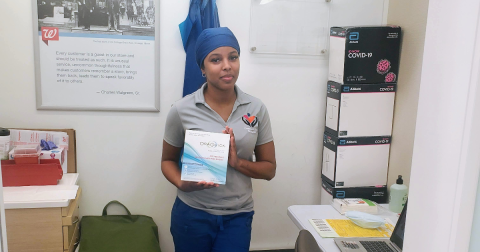
Community Care Resources Inc.: A Room of Their Own
Thanks to a successful partnership with local Walgreens pharmacies in Orlando, Hollywood and Wilton Manors, Florida, Community Care Resources (CCR) is able to offer free HIV and Sexually Transmitted Infection (STI) testing to a greater number of clients. Each of the pharmacies provides CCR staff with a private room for free testing services at once-a-week outreach events. Czarea Woods, CCR HIV Testing & Outreach Coordinator, recently helped one couple receive quick and private HIV testing at one of the Walgreens, and then directed her clients to the nearby CCR medical office to start pre-exposure prophylaxis (PrEP) treatment to protect themselves from HIV.
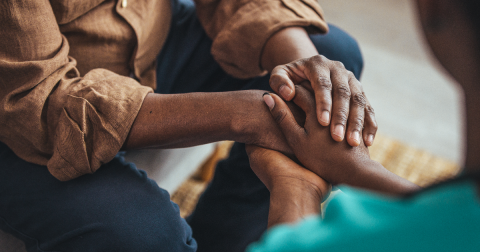
Eskenazi Health: Mission Accomplished
The HIV Self-Testing program shows how Eskenazi Health in Indianapolis, IN delivers on its mission to advocate, care, teach and serve. One client visited Eskenazi’s Emergency Department, extremely worried after a known exposure to HIV from an HIV-positive partner. After testing negative for HIV and starting post-exposure prophylaxis (PEP) during that visit, the client went home with a self-testing kit and a referral for mental health counseling. In a follow-up appointment, Clinical Public Health Program Community Health Educator, Mandi Fears started by asking simply, “How are you doing?” The patient was no longer anxious and felt relieved and grateful for the care. With the PEP treatment completed, and further self-testing, the patient has remained HIV negative.
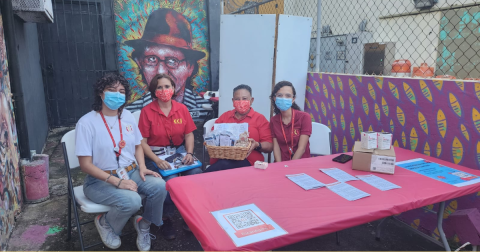
Estancia Corazón: Taking to the Streets
Often, the best approach to helping people is connecting directly with them as they go about their day. In December 2022, Estancia Corazón in San Juan, Puerto Rico introduced a new approach to distributing its HIV self-test kits. Teams set up kit distribution tables in the Rio Piedras district, positioning themselves in strategic locations where they knew people would congregate or pass by. Thanks to this direct approach, Estancia Corazón significantly increased their number of distributed self-test kits, while promoting their HIV prevention services, prompting staff member Ambar Delgado to report that “this strategy has done wonders for us.”
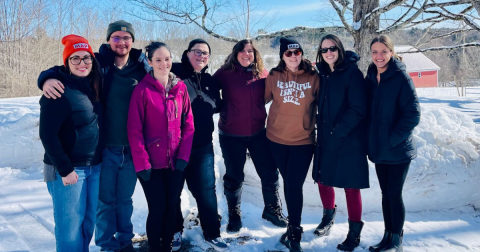
Frannie Peabody Center: All Over the Map
Frannie Peabody Center in Portland, Maine has exponentially increased the success of its HIV Self-Testing program across the state by partnering with Maine Access Points (MAP), a syringe service program. MAP says distributing the HIV self-testing kits has opened up proactive conversations about safer sex and preventative supplies. The successful partnership between Frannie Peabody Center and MAP has expanded to 10 of Maine’s 16 counties, including the hard-to-reach northern counties of Piscataquis, Northern Penobscot, Aroostook and Washington. Says one grateful participant: “It was super easy to do the test. I was nervous at first, but when I got it in the mail the instructions provided were super clear. The test was really accessible, and in the past, it was hard to get tested because I live in rural Maine."
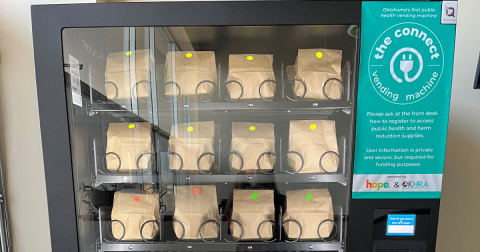
Health Outreach Prevention Education: A New Vending Machine
It’s an effective way to distribute drinks and snacks, so why not a vending machine for free HIV self-testing kits? Health Outreach Prevention Education (HOPE) in Tulsa, Oklahoma came up with this trailblazing idea, installing HIV self-testing kits in its first public health vending machine in the state. Through the vending machine, HOPE distributed 226 kits. HOPE Executive Director Taryn Norman calls this new strategy “an important success because it puts HIV self-testing kits into the hands of people who are high risk for acquiring HIV through injection drug use.” The vending machine also helps HOPE build relationships with people who are unstably housed or unhoused and isolated from mainstream health services. Ms. Norman says creating easier access to self-testing kits in this way helps remove barriers to testing in a state where 17% of people with HIV infections don’t know their health status.
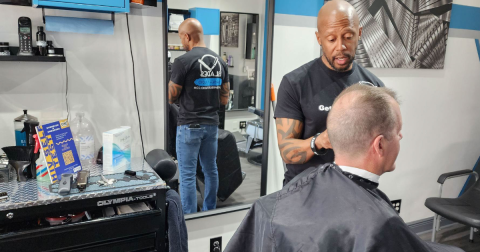
Holy Cross Health: More Than Just a Good Hair Day
Customers at Blades Barber Studio in Wilton Manor, Florida can get more than a clean cut and a close shave. In partnership with Holy Cross Health (HCH), barbershop owner Blades keeps a display of free HIV self-testing kits inside his popular barbershop, located in a community affectionately known as “Gay Village” because of its concentration of gay couples. “Having the HIV self-testing kits in my barbershop has allowed me to have conversations with people who at first didn’t know that an HIV self-testing kit was available to them,” says Blades. This kind of unique partnering with non-traditional businesses is one of HCH’s outreach strategies to increase awareness of HIV and access to testing kits. Adds Blades “Being able to provide this is my way of assisting my community in its efforts to have more thorough screening.”
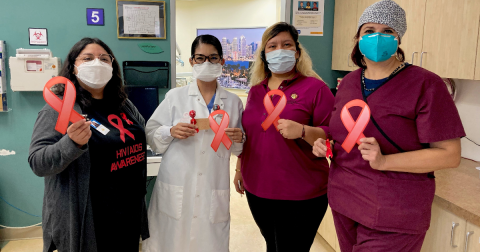
La Maestra Family Clinic: A Partner on Wheels
To commemorate World AIDS Day in December 2022, the HIV care team at La Maestra Family Clinic in San Diego, CA organized its most successful HIV self-test distribution outreach event yet. Outside La Maestra’s main office, team members gave away the greatest number of HIV self-testing kits they ever had. At the same time, a La Maestra mobile unit partnered with Custody to Community Transitional Reentry Program (CCTRP) to distribute HIV information and materials to community members recently released from prison. La Maestra staff member Madison Coulter called the multi-part World AIDS day event “a huge success” in the continued effort to target populations at risk for HIV in the San Diego area.
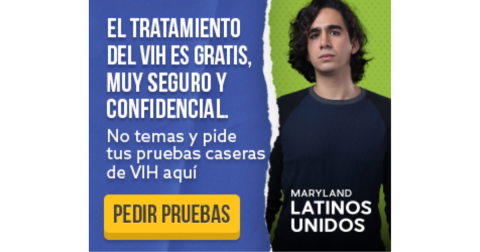
Maryland Latinos Unidos: Quiero Saber - I Want to Know
To maximize the impact of their HIV Self-Testing program, Maryland Latinos Unidos (MLU) joined forces with numerous Maryland health organizations to create a dynamic social media marketing campaign that raised awareness of the benefits of free, safe and confidential HIV self-testing kits. The successful campaign, titled “I Want to Know” (“Quiero Saber”), featured personal stories from key demographic groups: Latino transgender women, gay men, men who have sex with men, and young adults. By leveraging greater financial and technical support for the campaign, MLU was able to promote HIV testing across most major social media platforms including Instagram, Google Ads, Facebook, TikTok, and Telemundo driving more traffic to “I Want to Know” information websites and designated hotlines; and increasing requests for HIV home tests.
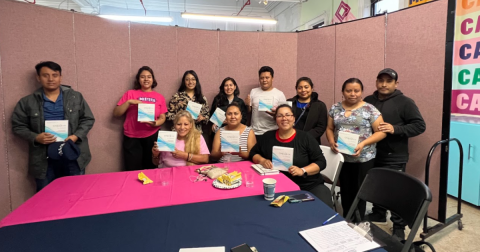
Mixteca Organization: Family Input Improves Outreach and Health
Some of the most effective community impact happens by reaching families. That’s how Mixteca, a community-based organization supporting Latinx immigrants in Brooklyn, NY approached their HIV awareness/HIV self-testing campaign. Mixteca sponsored a focus group to hear directly from families in the community about what programs and safe spaces could help alleviate the stigma of HIV. As part of the discussion, participants asked for more tips for parents on how to talk to their kids about HIV and HIV prevention, as well as more active use of social media to engage the community around the topic of HIV testing. The fruitful discussion ended with Mixteca staff demonstrating how to use an HIV self-test and giving away kits to each participant to take home.
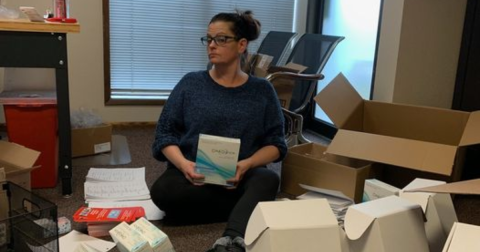
North Idaho Alliance of Care: Privacy Matters
North Idaho Alliance of Care (NIAC) in Coeur d’Alene knows it pays to advertise. To break down barriers to HIV testing, NIAC took out an ad for their free HIV self-testing kits on a gay dating site called Jack’d. NIAC Executive Director Theresa Davis says the ad was easy to place and was “the most impactful way to get the word out” to the local gay community about how to request an HIV self-testing kit shipped by mail. “It is anonymous and unintrusive. No one in the community will ever see you walk into the doors of an HIV testing center or walk up to a mobile testing unit in the community.” Davis called the privacy and confidentiality of a home kit one of the best strategies to help reduce stigma around HIV-testing.
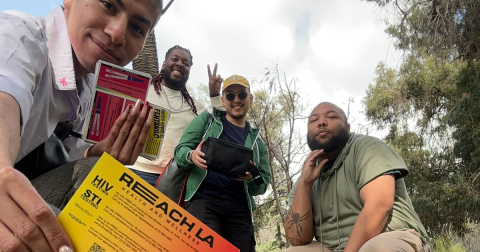
REACH LA: Reaching Out for a Healthier Community
REACH LA used the power of partnership to encourage people to protect themselves and others from HIV. REACH LA provides HIV testing as part of its mission to empower young LGBTQ+ people of color, and combined resources with Weber Community Center (WCC) that offers mental health services to low-income clients in South Central Los Angeles. WCC invited REACH LA to join its Black History Month Celebration where REACH LA staff gave away HIV self-testing kits. Elio Vargas, a Status Neutral Navigator for Reach LA was delighted at the community outreach opportunity, noting that “Our current healthcare system can be difficult to navigate, especially for black and brown folks.” At the event, Vargas engaged in conversation with two Latina women who were grateful to receive the kits since they’d found HIV testing access to otherwise be a challenge. Added Vargas: “Realizing that many individuals out there may have barriers motivated me to continue sharing more awareness and education.”
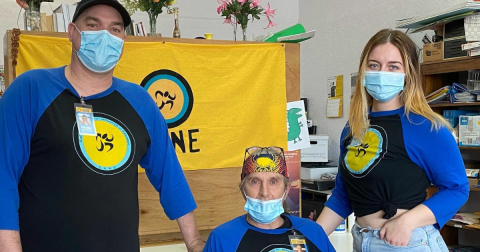
Safer Alternatives Thru Networking & Education: A Personal Touch
When a woman arrived at SANE (Safer Alternatives Thru Networking & Education in Sacramento, California, and asked for an HIV test, she received immediate care and compassion. After having a recent sexual encounter with an HIV-positive man, the woman had concerns about her own HIV status. SANE staff member Sonja Albin led the woman to a private office and helped her take an HIV self-test in a safe space. Thankfully, the test was negative. Ms. Albin then engaged her client in an intimate conversation, offering important advice and supplies for practicing safe sex in the future, adding “We were able to witness this woman go from uncertain and nervous, to supported and empowered.”
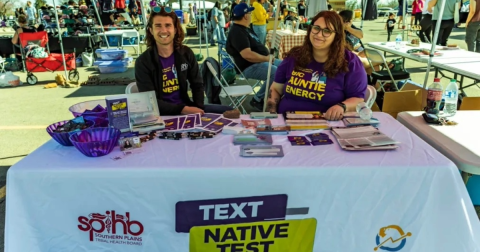
Southern Plains Tribal Health Board: Take the Test, Take Control
Southern Plains Tribal Health Board (SPTHB) in Oklahoma City saw a massive surge in requests for its HIV self-testing kits after a grateful client posted a TikTok video promoting SPTHB’s HIV prevention program called the Native Test. The TikTok video garnered over 533,000 views in a few days, and the requests for home kits began pouring in. Using the slogan “Take the Test, Take Control” the Native Test program has now mailed out over 3,400 HIV test kits to users in all 48 contiguous states and even made referrals to Alaska and Hawaii.
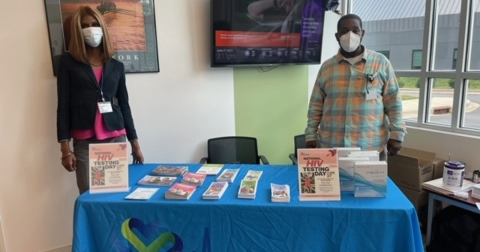
The C.W. Williams Community Health Center: For Quality of Life
As part of their mission to provide quality primary and preventative healthcare for the medically underserved in Charlotte, NC, The C.W. Williams Community Health Center, Inc. (CWWCHC) helps community members who face numerous adversities. At one outreach event hosted by CWWCHC’s HIV Care Team, an unhoused man noticed they were giving away free HIV self-testing kits. The man already knew he was HIV positive but approached the table because he didn’t know where to go for treatment. CWWCHC staff immediately referred the man to care and worked closely with him to start an HIV treatment plan. They also connected him to housing and emergency financial assistance. Thanks to wrap-around support from CWWCHC, the patient soon found a job, was able to move into an apartment, and remains healthy. “We are extremely proud of CWWCHC's HIV Care Team,” says Chief Development Officer Kelly Hurley. “We save lives and improve quality of life every day!"
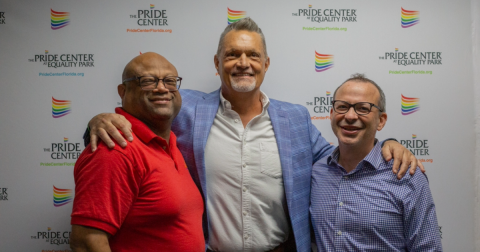
The Pride Center at Equality Park: It's a Big Deal
As part of their effort to educate the community about HIV self-testing and reduce stigma, The Pride Center at Equality Park in Wilton Manors, Florida hosted a series of four town hall meetings called “The Intersection of Lust, Love & Stigma”. At the kickoff meeting, called “Stigma Enigma: What’s the Big Deal?” panelists from local partner organizations led lively discussions exploring the impact of stigma on the mind and body. As part of the conversation, speakers addressed the importance of routine HIV-testing, and demonstrated how to use a self-testing kit, showing just how convenient and private they are. Kits were then available for all attendees to take home. Pride Center staff member Danny Sprouse called the event “a magical, educational, and eye-opening experience.”
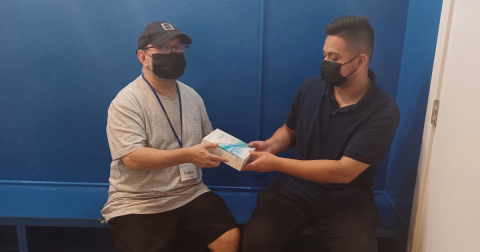
Thrive DC: Thriving in the Nation's Capital
In keeping with its mission to provide comprehensive services to the homeless in Washington D.C., Thrive DC offers HIV testing and follow-up support. One Hispanic male client’s story highlights the success of the program. The man, who identifies as gay, came to Thrive DC wanting to know his HIV status after having unprotected sex. Thrive DC Social Services Manager, Gabriel Fabre, provided him with an HIV self-testing kit. When the test came out positive, Mr. Fabre set the client up with counseling, and gave him a referral for HIV treatment at a nearby medical facility. The client is now taking medication to treat HIV and continues to receive counseling through Thrive DC’s services. “The client feels good about it,” says Mr. Fabre, adding that he is “thankful for the kit Thrive DC provided.”
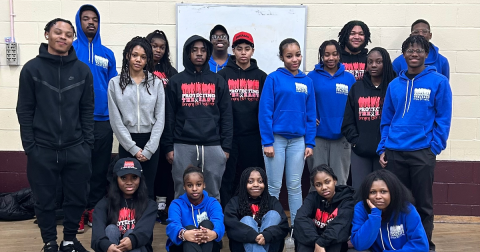
United Community Centers, Inc.: The Kids Are Alright
Knowing that the best way to reach a young audience is through social media, United Community Centers, Inc. (UCC) in Brooklyn, NY heavily promoted its HIV Self-Testing Program on World AIDS Day 2022 through videos on TikTok and Instagram reels. When one young member of the community first saw the TikTok video, they placed an order for a self-testing kit and then reached out to UCC staff with follow-up questions. The client was so impressed with their experience that they signed up for an internship with UCC as “social media ambassador” to continue to promote the HIV Self-Testing Program. Thanks to the enthusiastic young hire, UCC has been able to further its presence on social media and increase community engagement around its HIV-related services.
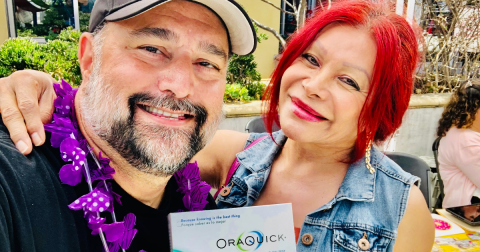
VIDA: VIDA is Life
In keeping with its goal to reduce HIV within the Latinx community in San Diego, CA, VIDA promoted its HIV Self-Testing program on local TV just ahead of National Latinx AIDS Awareness Day in October 2022. VIDA founder Esteban Duarte appeared on KGTV-10 news to tell viewers where they could pick up free HIV self-testing kits, without an appointment, and interact with both English and Spanish-speaking staff. For Duarte, promoting the Self-Testing Program this way highlights VIDA’s efforts to “raise awareness and highlight the stigmas” that limit access to HIV prevention and treatment services. Adds Duarte, “We are here to to educate, support, and celebrate life.”
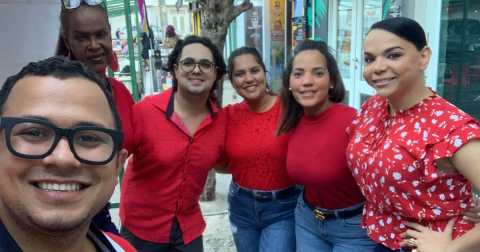
Waves Ahead: Catching A Wave
As part of its HIV self-testing kit distribution strategy, Waves Ahead in San Juan, Puerto Rico went looking for the party. The Puerto Rican organization provides advocacy and services for the LGBT+ community, and on World AIDS Day in December 2022, it partnered with a gay bar in the lively neighborhood of Santurce for an HIV self-testing kit give-away event. Inside the bar, the Waves Ahead team set up tables displaying self-testing kits to take home, as well as educational material around HIV prevention and care. The Waves Ahead team was able to connect with numerous bar patrons of different ages and gender identities about the testing program. Waves Ahead staff member Kiaranel Castro called it a high point of their self-testing kit distribution effort: “It is very exciting to hear from people who are grateful and happy for the accessibility of a test.”
This project is supported by the Centers for Disease Control and Prevention of the U.S. Department of Health and Human Services (HHS) as part of a financial assistance award totaling $9M with 100 percent funded by CDC/HHS. The contents are those of the author(s) and do not necessarily represent the official views of, nor an endorsement, by CDC/HHS or the U.S. Government.